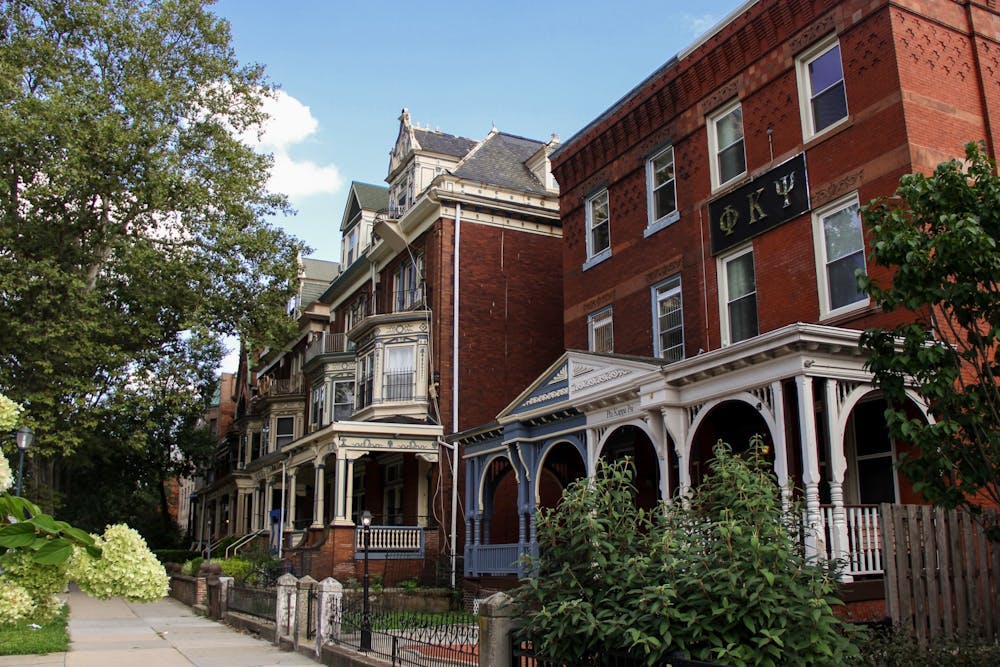
IFC fraternities will be holding recruitment online this fall.
Credit: Gary LinIn place of the typical excitement surrounding fall recruitment, empty fraternity chapter houses line Locust Walk this fall, as students are now forced to reimagine their Greek life experience with Zoom hangouts and virtual rush.
While some fraternity members are living off-campus together, College senior and President of Interfraternity Council Louis Galarowicz said IFC fraternities have adjusted to Zoom meetings and plan to hold fall recruitment online with hopes for in-person rush this spring.
The IFC is comprised of 25 male fraternities and two co-ed fraternities, recognized by Penn and affiliated with a national organization. National organizations of IFC chapters at Penn, such as Delta Tau Delta and Phi Gamma Delta, have released COVID-19 guidelines recommending that fraternity events and recruitment are held virtually.
College senior Matt Garber, who is president of Delta Tau Delta, commonly known as Delt, said Delt will expand its social media and implement a referral strategy, where members and the student body can recommend prospective members to the leaders of the fraternity.
Phi Gamma Delta, commonly known as FIJI, will host meetings and luncheons over Zoom for potential new members this fall, but still prefers in-person meetings, Wharton sophomore and FIJI member Diego Noriega said.
“We probably won’t have [in-person meetings], but we’re hopeful that we can be allowed to safely see individuals next semester,” Noriega said.
Business fraternity Phi Chi Theta, a fraternity not a part of IFC, is also working to increase its social media presence, host virtual events to discuss and share members' experiences with the chapter, and reach out to groups that are “underrepresented within the business community," Wharton and College senior and President of Phi Chi Theta Daniel Gordon said.
“This pandemic, as unfortunate as it is, has given us an opportunity to unleash our creative side when planning and disseminating these events,” Gordon said.
Gordon helped organize an annual “Business 101” event over Zoom on Aug. 28 for first years who wanted to learn more about the Wharton curriculum and the business fraternity. Gordon said after the presentation, they held a networking session where first years could ask questions to the fraternity members.
Garnering over 250 participants on the Zoom call, Gordon said Phi Chi Theta is looking forward to conducting more events, such as an opportunity for students to network with Wharton MBA organizations in a similar manner.

Gordon also hoped for in-person recruiting come next semester, adding that the COVID-19 pandemic will certainly have a negative impact on the Greek life experience for current and potential new members.
“It would be better to do [recruitment] in person to get to know people better, but virtual recruitment is likely to become more prominent with jobs and other things being transferred online,” Gordon said. “Even if it’s not optimal for us to recruit virtually, it’s solid practice for an increasingly technological future.”
Following the closure of on-campus housing this fall, many students scrambled to find off-campus housing, including those involved in Greek life. Twenty-five out of the 27 fraternities in the Interfraternity Council are operated by the University and therefore not allowed to use their chapter houses, Galarowicz said.
Noriega said he and five other FIJI members are living together in an off-campus apartment. Garber is also living in an off-campus house with friends, including one of his fellow Delt brothers who lost on-campus housing when Penn announced its plans to no longer invite students back to campus.
“We’re basically making sure that we’re being safe, but [the off-campus house's] doors are open for brothers who want to live there,” Garber said.
Garber added he believes fraternity members who are now living off-campus together can still socialize while abiding by social distancing guidelines.
“Some chapters could do things outside in public areas where they could spread out,” he said. “A sorority or fraternity hosting [a party] at their house is probably not going to happen.“
Noriega agreed, adding that he and his fellow FIJI brothers are taking precautions to avoid spreading coronavirus.
Though large gatherings are prohibited – by both the University and the city – parties without social distancing have been spotted around Penn in the past week. Galarowicz maintains that the Greek-related parties have all been hosted by off-campus fraternities and are not affiliated with the IFC.
Galarowicz praised IFC fraternities' response to the pandemic, citing the importance of maintaining friendships and continuing social interactions with fellow brothers while staying safe.
“At its core, at least to me, [Greek life] is about brotherhood," he said. "I’ve seen a lot of people visiting each other and opening up their houses, and that’s nice to see.”
For social events, fraternity members host online poker tournaments, Zoom hangouts, and multiplayer video games, all of which Galarowicz said were also done during the spring, when classes moved online in March. He added that mentorship programs, logistics meetings, and chapter board meetings for the IFC will also be moved to Zoom.
Garber acknowledged that the pandemic will continue to dilute the Greek life experience for the next several years but predicts it will reap long term benefits.
"I think [the pandemic] demonstrated to us how important the kind of close bonds with your peers in college are,” Garber said. “There will be some chapters that close, but I also think that the value of Greek life will be enhanced rather than diminished and, at the end of all this, the organizations that remain will come out a lot stronger.”
The Daily Pennsylvanian is an independent, student-run newspaper. Please consider making a donation to support the coverage that shapes the University. Your generosity ensures a future of strong journalism at Penn.
Donate







